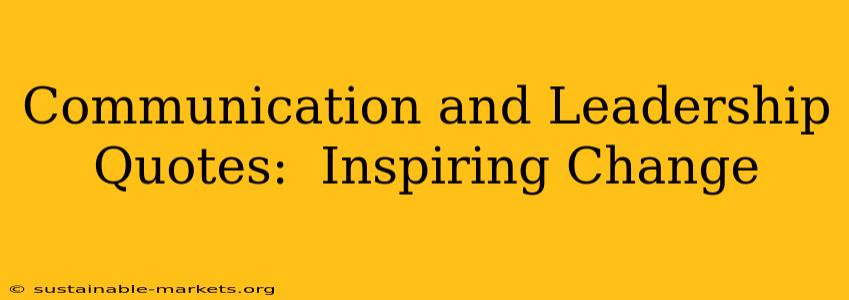Effective communication and strong leadership are inextricably linked. Great leaders don't just give orders; they inspire, motivate, and guide their teams towards a shared vision. This requires masterful communication—the ability to articulate that vision clearly, build trust, and foster collaboration. This article explores the powerful intersection of communication and leadership, drawing on insightful quotes that highlight their importance in driving positive change. We'll delve into how these principles translate into practical action, providing a framework for both aspiring and established leaders to enhance their impact.
What Makes a Good Leader? The Role of Communication
Many successful leaders emphasize the crucial role communication plays in their achievements. It's not simply about conveying information; it's about connecting with people on an emotional level, understanding their perspectives, and fostering a culture of open dialogue. This fosters trust and commitment, paving the way for significant change.
"The single biggest problem in communication is the illusion that it has taken place." – George Bernard Shaw
This quote highlights a fundamental challenge: assuming communication has occurred when, in reality, the message hasn't been received or understood correctly. Effective leaders actively seek feedback, ensuring clarity and understanding. They don't just talk; they listen.
How Can Leaders Communicate Effectively?
Effective communication in leadership isn't a one-size-fits-all approach. It requires adaptability and a deep understanding of your audience. Here are some key aspects:
- Active Listening: Truly hearing and understanding what others are saying, beyond just waiting for your turn to speak.
- Clear and Concise Messaging: Avoiding jargon and ensuring your message is easily understood by everyone.
- Transparency and Honesty: Building trust by being open and upfront, even when delivering difficult news.
- Empathy and Emotional Intelligence: Understanding and responding to the emotions of your team.
- Nonverbal Communication: Being aware of your body language and its impact on others.
Inspiring Quotes on Communication and Leadership
Numerous insightful quotes underscore the importance of communication in leadership. Let’s explore a few more:
"Leadership is influence, nothing more, nothing less." – John C. Maxwell
This quote emphasizes that leadership is not about authority; it's about the ability to positively influence others. And influence is largely driven by effective communication.
"The art of communication is the language of leadership." – James Humes
This quote directly links the skill of communication with effective leadership. It's a skill that can be honed and developed.
"The key is not to prioritize what's on your schedule, but to schedule your priorities." – Stephen Covey
While not strictly a communication quote, it speaks to the organizational and prioritization skills necessary for a leader to effectively communicate their vision and expectations. Clear communication requires a clear plan.
Overcoming Communication Barriers
Obstacles to effective communication are common. These might include:
- Cultural Differences: Different cultures have varying communication styles.
- Technological Barriers: Relying solely on email or instant messaging can lead to misunderstandings.
- Information Overload: Too much information can lead to confusion and overwhelm.
- Lack of Trust: A lack of trust can create barriers to open and honest communication.
How to Improve Communication and Leadership Skills?
Improving communication and leadership skills is an ongoing process. Here are some practical steps:
- Seek feedback regularly: Ask for honest feedback from your team and colleagues.
- Attend workshops and training: Develop your communication and leadership skills through professional development.
- Read books and articles: Stay current on the latest research and best practices.
- Practice active listening: Consciously focus on listening attentively to others.
- Reflect on your communication style: Identify areas for improvement and work on them.
In conclusion, effective communication is the cornerstone of strong leadership. By embracing the principles outlined above and drawing inspiration from the insightful quotes discussed, leaders can foster a culture of trust, collaboration, and positive change. The journey towards becoming a more effective communicator and leader is a continuous one, requiring consistent effort, self-reflection, and a commitment to growth.

